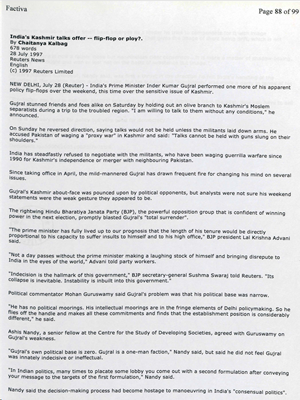India’s Kashmir talks offer — flip-flop or ploy?
[Reuters]
Published date: 28th Jul 1997
28 July 1997
Reuters News
English
(c) 1997 Reuters Limited
NEW DELHI, July 28 (Reuter) – India’s Prime Minister Inder Kumar Gujral performed one more of his apparent policy flip-flops over the weekend, this time over the sensitive issue of Kashmir.
Gujral stunned friends and foes alike on Saturday by holding out an olive branch to Kashmir’s Moslem separatists during a trip to the troubled region. “I am willing to talk to them without any conditions,” he announced.
On Sunday he reversed direction, saying talks would not be held unless the militants laid down arms. He accused Pakistan of waging a “proxy war” in Kashmir and said: “Talks cannot be held with guns slung on their shoulders.”
India has steadfastly refused to negotiate with the militants, who have been waging guerrilla warfare since 1990 for Kashmir’s independence or merger with neighbouring Pakistan.
Since taking office in April, the mild-mannered Gujral has drawn frequent fire for changing his mind on several issues.
Gujral’s Kashmir about-face was pounced upon by political opponents, but analysts were not sure his weekend statements were the weak gesture they appeared to be.
The right wing Hindu Bharatiya Janata Party (BJP), the powerful opposition group that is confident of winning power in the next election, promptly blasted Gujral’s “total surrender”.
“The prime minister has fully lived up to our prognosis that the length of his tenure would be directly
proportional to his capacity to suffer insults to himself and to his high office,” BJP president Lal Krishna Advani said.
“Not a day passes without the prime minister making a laughing stock of himself and bringing disrepute to India in the eyes of the world,” Advani told party workers.
“Indecision is the hallmark of this government,” BJP secretary-general Sushma Swaraj told Reuters. “Its collapse is inevitable. Instability is inbuilt into this government.”
Political commentator Mohan Guruswamy said Gujral’s problem was that his political base was narrow.
“He has no political moorings. His intellectual moorings are in the fringe elements of Delhi policymaking. So he filles off the handle and makes all these commitments and finds that the establishment position is considerably different,” he said.
Ashis Nandy, a senior fellow at the Centre for the Study of Developing Societies, agreed with Guruswamy on Gujral’s weakness.
“Gujral’s own political base is zero. Gujral is a one-man faction,” Nandy said, but said he did not feel Gujral was innately indecisive or ineffectual.
“In Indian politics, many times to placate some lobby you come out with a second formulation after conveying your message to the targets of the first formulation,” Nandy said.
Nandy said the decision-making process had become hostage to manoeuvring in India’s “consensual politics”.
Gujral heads the fractious 15-group United Front coalition embracing centrists and free-marketeers. The Congress party, which suffered a humiliating general election defeat in May 1996, offers the coalition external but grudging support.
The United Front and Congress are bound by their mutual dislike of the BJP and fear that it may grab power.
“Whenever someone with a small base emerges as a leader he tries to compensate for it with image management, management of middle-class opinion. That gives the image of there being drift, which is not true,” Nandy said.
“In reality there is now a rather loose but nonetheless clear consensus … It is more a matter of shadow-boxing. Elections are fought and won or lost not on the basis of substance but image.”
Gujral’s Kashmir turnabout, Nandy said, was first a thrust in the direction he felt India’s handling of the situation in the volatile region ought to take, but his subsequent “climbdown” was more a parry in terms of his own coalition’s constituents.
Previously you had to sell new political intervention as a radical departure from the past. Now you have to sell any radical policy departure in the language of continuity,” Nandy said.
“This is not very good for policy but very good for democracy.”
(c) Reuters Limited 1997






